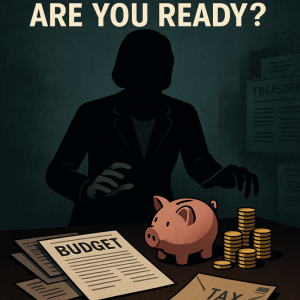…and why this headline proves my point perfectly!

Are you budget ready?
If that headline made you click, congratulations — you’ve just demonstrated exactly why the media loves Budget season.
It’s the time of year when fear sells faster than a hot stock tip. Every newspaper, website, and financial influencer is competing to make you believe that your pension is about to be raided, property taxes will skyrocket, and you should sell everything and hide your money under the mattress.
And it works — because none of us want to be caught off guard. We all want to do something before “it’s too late.”
The result? Advisers like me get a flurry of calls and emails from worried people asking whether they should cash in pensions, gift assets, downsize their homes, or move investments before the Chancellor “takes it all away.”
Perfectly sensible questions, perfectly understandable feelings — but here’s the truth: nobody actually knows what’s coming.
So, take a deep breath, ignore the noise for a moment, and read on for some common-sense advice about how to stay calm, stay smart, and stay focused.
1. We can only plan based on the rules that exist today
At Ideal Financial Management, our advice is built on facts, not forecasts. Until the Budget is announced and legislation is written, everything else is just noise. The details are kept tightly under wraps within the Treasury’s inner circle — and no, despite what the media might imply, there are no leaks to the financial advisers of Doncaster.
If we tried to anticipate every rumoured change, we’d be planning blindfolded. That’s not financial planning — that’s guesswork with a spreadsheet.
2. The media doesn’t know your circumstances — or your plan
This time of year is a goldmine for journalists. They know fear drives engagement. After all, “Government may leave pensions alone” doesn’t exactly get clicks. But “Pension raid imminent!” certainly does.
It’s worth remembering that the people writing these headlines don’t know you. They don’t understand your goals, your financial structure, or your tax position. They’re not regulated advisers, and they won’t be responsible if their dramatic predictions are completely wrong.
So when you feel that twinge of anxiety after reading an article about the “upcoming Budget bombshell,” just remember — that was the intention.
3. Fear sells. Always has, always will.
In uncertain times, fear is a powerful marketing tool. Media outlets make their money from attention, and nothing grabs attention like the prospect of losing yours.
So they fill the void before the Budget with endless speculation — each article more dramatic than the last — because they know it keeps people reading, sharing, and worrying.
It’s not that the writers are malicious; they’re just doing what works. But when it comes to your personal finances, reacting to headlines is rarely a good strategy.
4. The psychology of the “Budget bluff”
As an adviser I often find it frustrating that the Chancellor does not rule out some of the speculation to enable clients and advisers to plan efficiently. At the last budget, rumours were rife about reducing tax free cash and thousands ended up raiding their pension funds for no subsequent reason – and then complained that they couldn’t put the money back in.
But here’s one final twist worth noting: sometimes the Government lets rumours run wild on purpose. If the public expects a brutal tax raid and the final announcement is merely moderate, we all breathe a sigh of relief and feel almost grateful.
It’s like expecting a tooth extraction and getting away with a quick polish instead. Pain avoided feels like a win — even when it was never really on the table.
5. What you should actually do
For now, do what calm, sensible investors always do: stick to your plan, focus on what you can control, and wait for the actual Budget details.
Once the Chancellor finally reveals what’s changing (and what isn’t), we’ll analyse it carefully and share a clear, balanced breakdown of what really matters for your finances.
Until then, take a break from the headlines. The world isn’t ending — and your financial plan shouldn’t change just because a journalist needed a good story.
Happy investing
Brian






